- Python Basic Programs
- Python Program Examples
- Python Print Hello World
- Python Get Input from User
- Python Add Two Numbers
- Add Subtract Multiply Divide
- Python Check Even or Odd
- Python Check Prime or Not
- Python Check Alphabet or Not
- Python Check Vowel or Not
- Python Check Leap Year or Not
- Check Reverse equal Original
- Check Positive Negative Zero
- Python Check Armstrong or Not
- Python Check Palindrome or Not
- Python Check Perfect Number
- Python Find Reverse of Number
- Python Count Digits in Number
- Python Add Digits of Number
- Sum of First and Last Digits
- Python Product of Mid Digits
- Sum of Squares of Digits
- Interchange Digits of Number
- Python Sum of n Numbers
- Python Print ASCII Values
- Python Swap Two Numbers
- Python Swap Two Variables
- Python Fahrenheit to Celsius
- Python Celsius to Fahrenheit
- Python Display Calendar
- Python Days into Years, Weeks
- Find Largest of Two Number
- Find Largest of Three Number
- Python Print Fibonacci Series
- Generate Armstrong Numbers
- Python Make Simple Calculator
- Python Add Binary Numbers
- Binary Number Multiplication
- Python Mathematical Programs
- Find Sum of Natural Numbers
- Find Average of n Numbers
- Python Print Multiplication Table
- Print Table using Recursion
- Python Find Average Percentage
- Python Find Grade of Student
- Find Square Root of Number
- Python Print Prime Numbers
- Find Numbers Divisible by
- Python Find Factors of Number
- Python Find Factorial of a Number
- Python Find HCF & LCM
- Python Kilometres to Miles
- Python Find Area of Square
- Python Find Area of Rectangle
- Python Find Area of Triangle
- Python Find Area of Circle
- Python Find Perimeter of Square
- Find Perimeter of Rectangle
- Python Find Perimeter of Triangle
- Find Circumference of Circle
- Python Simple Interest
- Python Solve Quadratic Equation
- Python Different Set of Operations
- Python Display Powers of 2
- Python Find nCr & nPr
- Python Pattern Programs
- Python Print Pattern Programs
- Python Print Diamond Pattern
- Python Print Floyd's Triangle
- Python Print Pascal's Triangle
- Python List Programs
- Python Count Even/Odd in List
- Python Positive/Negative in List
- Python Even Numbers in List
- Python Odd Numbers in List
- Python Sum of Elements in List
- Sum of Odd/Even Numbers
- Python Element at Even Position
- Python Element at Odd Position
- Python Search Element in List
- Python Largest Number in List
- Python Smallest Number in List
- Python Second Largest in List
- Python Second Smallest in List
- Python Insert Element in List
- Python Delete Element from List
- Python Multiply Numbers in List
- Swap Two Elements in List
- Python 1D Array Program
- Python Linear Search
- Python Binary Search
- Python Insertion Sort
- Python Bubble Sort
- Python Selection Sort
- Remove Duplicates from List
- Python Reverse a List
- Python Merge Two List
- Python Copy a List
- Python Conversion Programs
- Python Decimal to Binary
- Python Decimal to Octal
- Python Decimal to Hexadecimal
- Python Binary to Decimal
- Python Binary to Octal
- Python Binary to Hexadecimal
- Python Octal to Decimal
- Python Octal to Binary
- Python Octal to Hexadecimal
- Python Hexadecimal to Decimal
- Python Hexadecimal to Binary
- Python Hexadecimal to Octal
- Python Matrix Programs
- Python Add Two Matrices
- Python Subtract Two Matrices
- Python Transpose Matrix
- Python Multiply Matrices
- Python String Programs
- Python Print String
- Python Find Length of String
- Python Compare Two Strings
- Python Copy String
- Python Concatenate String
- Python Reverse a String
- Python Swap Two Strings
- Python Uppercase to Lowercase
- Python Lowercase to Uppercase
- Python Check Substring in String
- Python Count Character in String
- Count Repeated Characters
- Python Count Word in Sentence
- Python Count Each Vowels
- Python Capitalize Character
- Python Capitalize Word in String
- Python Smallest/Largest Word
- Remove Spaces from String
- Remove Duplicate Character
- Remove Vowels from String
- Remove Punctuation from String
- Python Remove Word in String
- Python Remove Duplicate Words
- WhiteSpace to Hyphens
- Replace Vowels with Character
- Replace Character in String
- Python Sort String in Alphabetical
- Sort Word in Alphabetical Order
- Extract Number from String
- Python Check Anagram Strings
- Python File Programs
- Python Read a File
- Python Write to File
- Python Append Text to File
- Python Copy Files
- Python Merge Two Files
- Python Counts Characters in File
- Python Count Words in File
- Python File Content in Reverse
- Python Lines Contains String
- Python Delete Line from File
- Python Capitalize Word in File
- Python Replace Text in File
- Replace Specific Line in File
- Python Find Size of File
- Python List Files in Directory
- Python Delete Files
- Python Misc Programs
- Python Reverse a Tuple
- Python Merge Two Dictionary
- Python bytes to String
- Python bytearray to String
- Generate Random Numbers
- Python Print Address of Variable
- Python Print Date and Time
- Python Get IP Address
- Python Shutdown/Restart PC
- Python Tutorial
- Python Tutorial
Python Program to Convert Binary to Hexadecimal
In this article, we've created some programs in Python, to convert any binary number entered by user to its equivalent hexadecimal value. Here are the list of programs:
- Binary to Hexadecimal with User-defined Code
- Binary to Hexadecimal using int() and hex() Methods
Note - Before creating these programs, if you're not aware about some steps used for the conversion, refer to Binary to Hexadecimal Conversion Steps and Formula to get every required things.
Binary to Hexadecimal with User-defined Code
To convert binary to hexadecimal number in Python, you have to ask from user to enter a number in binary number system to convert that number into hexadecimal number system as shown in the program given here.
The question is, write a Python program to convert binary to hexadecimal using while loop. Here is its answer:
print("Enter the Binary Number: ") bnum = int(input()) hex = 0 mul = 1 chk = 1 i = 0 hnum = [] while bnum!=0: rem = bnum%10 hex = hex + (rem*mul) if chk%4==0: if hex<10: hex = hex+48 val = chr(hex) hnum.insert(i, val) else: hex = hex+55 val = chr(hex) hnum.insert(i, val) mul = 1 hex = 0 chk = 1 i = i+1 else: mul = mul*2 chk = chk+1 bnum = int(bnum/10) if chk!=1: hex = hex+48 val = chr(hex) hnum.insert(i, val) if chk==1: i = i-1 print("\nEquivalent Hexadecimal Value = ", end="") while i>=0: print(end=hnum[i]) i = i-1 print()
Here is the initial output produced by this Python program:
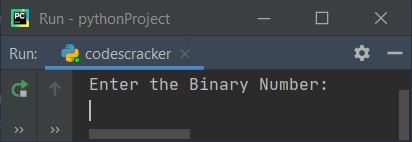
Now supply the input say 111011 and press ENTER key to convert it into its equivalent
hexadecimal value and print the hexadecimal value on output as shown in the snapshot given below:
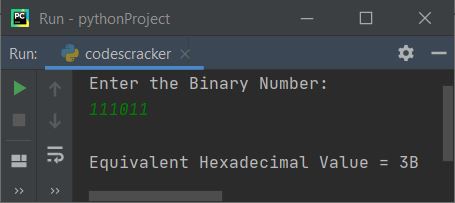
Note - The chr() method is used to returns equivalent character to the Unicode specified as its argument.
The insert() method is used to insert an element to the list. Therefore the following statement:
hnum.insert(i, val)
can be treated as:
hnum[i] = val
That is, the value of val variable gets initialized to ith index of hnum list.
The dry run of above program, with user input 111011 goes like:
- Initial values, bnum=111011 (entered by user), hex=0, mul=1, chk=1, i=0
- The condition (of while loop) bnum!=0 or 111011!=0 evaluates to be true, therefore program flow goes inside the loop
- Inside the loop, the first statement, that is:
rem = bnum%10
gets executed - Therefore bnum%10 or 111011%10 or 1 gets initialized to rem
- hex + (rem*mul) or 0 + (1*1) or 1 gets initialized to hex
- The condition (of if) chk%4==0 or 1%4==0 evaluates to be false, therefore program flow does not goes inside this if's block, rather it goes to its else's part
- And mul*2 or 1*2 or 2 gets initialized to mul. So mul=2
- chk+1 or 1+1 or 2 gets initialized to chk. So chk=2
- And finally, int(bnum/10) or int(111011/10) or 11101 gets initialized to bnum
- The condition (of while loop) bnum!=0 again gets evaluated with new value of bnum. That is, bnum!=0 or 11101!=0 evaluates to be true again, therefore program flow goes inside the loop again. This process continues, until the condition evaluates to be false
- In this way, the binary number entered by user gets converted into its equivalent hexadecimal value
The condition:
if chk%4==0:
is applied to check four-four pair of binary digits to convert into its equivalent hexadecimal digit.
And the condition:
if hex<10:
is applied to check whether the equivalent hexadecimal digit is less than 10 or not. That is, if it is 10, 11, 12, ..., 15. Then we've to store A, B, C, ..., F in place of these.
For example, if hex digit is 12, then the condition hex<10 evaluates to be false, therefore its else's counterpart gets executed. And in place of 12 we've to store C. Therefore C gets stored through following block of code:
hex = hex+55 val = chr(hex) hnum.insert(i, val)
Since hex=12, therefore hex+55 or 12+55 or 67 gets initialized to hex. And chr(hex) returns the corresponding character equals to the Unicode specified as its argument, that is the value of hex, 67. Since 67 is the ASCII value of C. Therefore val = C. And the value of val gets initialized to ith index of hnum.
Modified Version of Previous Program
This program is the modified version of previous one. The end= is used to skip printing of an automatic newline using print().
print("Enter the Binary Number: ", end="") bnum = int(input()) hex = 0 mul = 1 chk = 1 i = 0 hnum = [] while bnum!=0: rem = bnum%10 hex = hex + (rem*mul) if chk%4==0: if hex<10: hnum.insert(i, chr(hex+48)) else: hnum.insert(i, chr(hex+55)) mul = 1 hex = 0 chk = 1 i = i+1 else: mul = mul*2 chk = chk+1 bnum = int(bnum/10) if chk!=1: hnum.insert(i, chr(hex+48)) if chk==1: i = i-1 print("\nEquivalent Hexadecimal Value = ", end="") while i>=0: print(end=hnum[i]) i = i-1 print()
Here is its sample run with user input, 1101110:
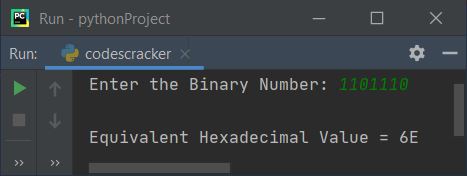
Binary to Hexadecimal using int() and hex()
This program uses int() and hex() methods to do the job of converting binary to hexadecimal.
print("Enter the Binary Number: ", end="") bnum = input() b = int(bnum, 2) hdnum = hex(b) print("\nEquivalent Hexadecimal Value = ", hdnum)
Here is its sample run with user input 111101 as binary number:
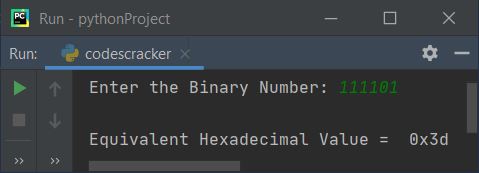
While receiving the input, we've not specified the type, therefore the entered value by user gets treated as a string type value. And using int() method with 2 as its second argument, converted the given value into an integer type value of base 2, that is binary number.
And using hex() method, the binary number gets converted into its equivalent hexadecimal value.
Modified Version of Previous Program
This program uses hdnum[2:] to print element(s) starting from second index. That is, the first two characters gets skipped after applying [2:]. And upper() is used to capitalize the lowercase character.
print("Enter the Binary Number: ", end="") bnum = input() b = int(bnum, 2) hdnum = hex(b) print("\nEquivalent Hexadecimal Value = ", hdnum[2:].upper())
Here is its sample run with user input, 11100111:
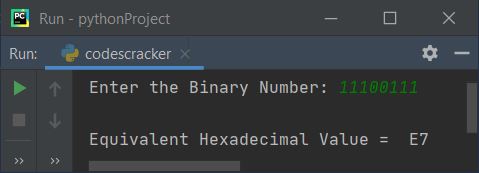
Same Program in Other Languages
- Java Convert Binary to Hexadecimal
- C Convert Binary to Hexadecimal
- C++ Convert Binary to Hexadecimal
« Previous Program Next Program »